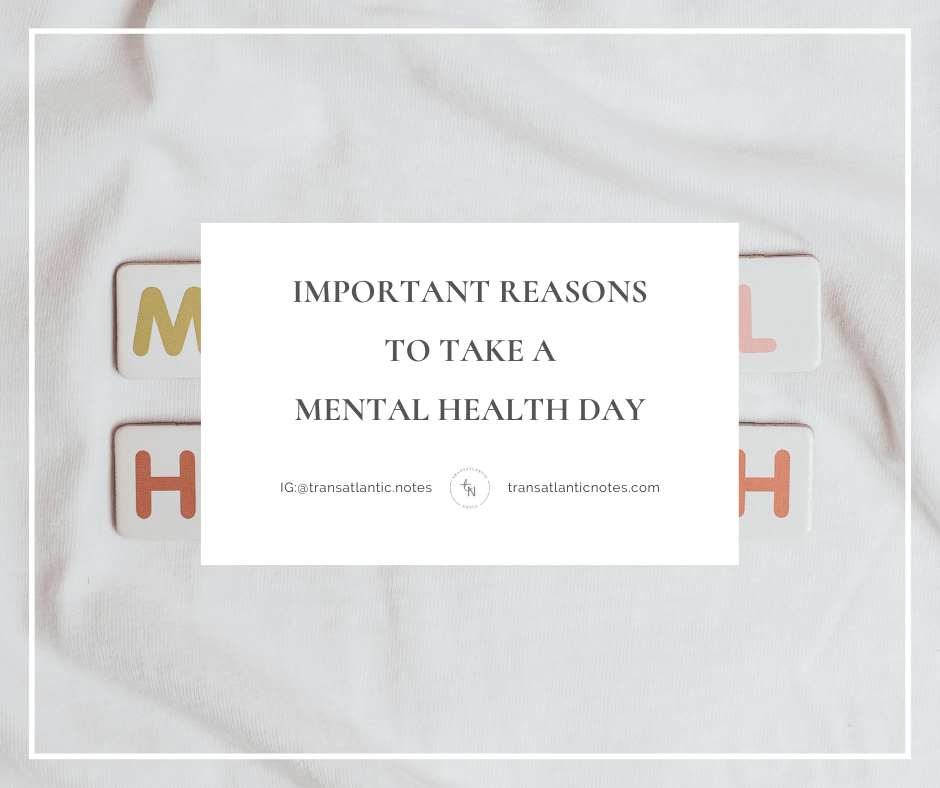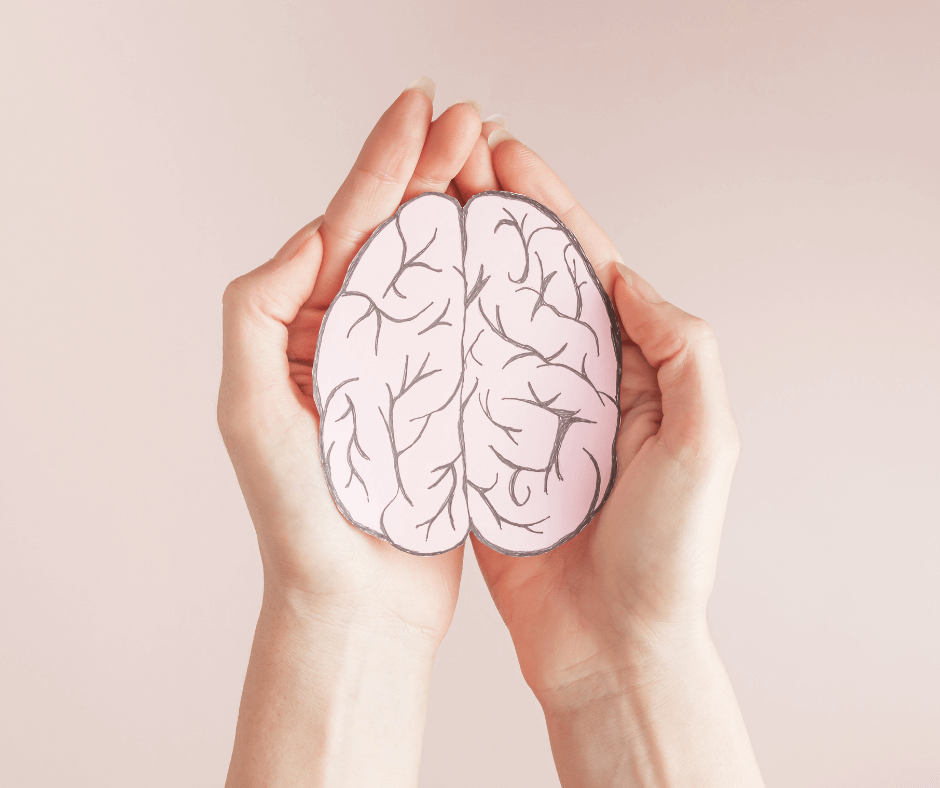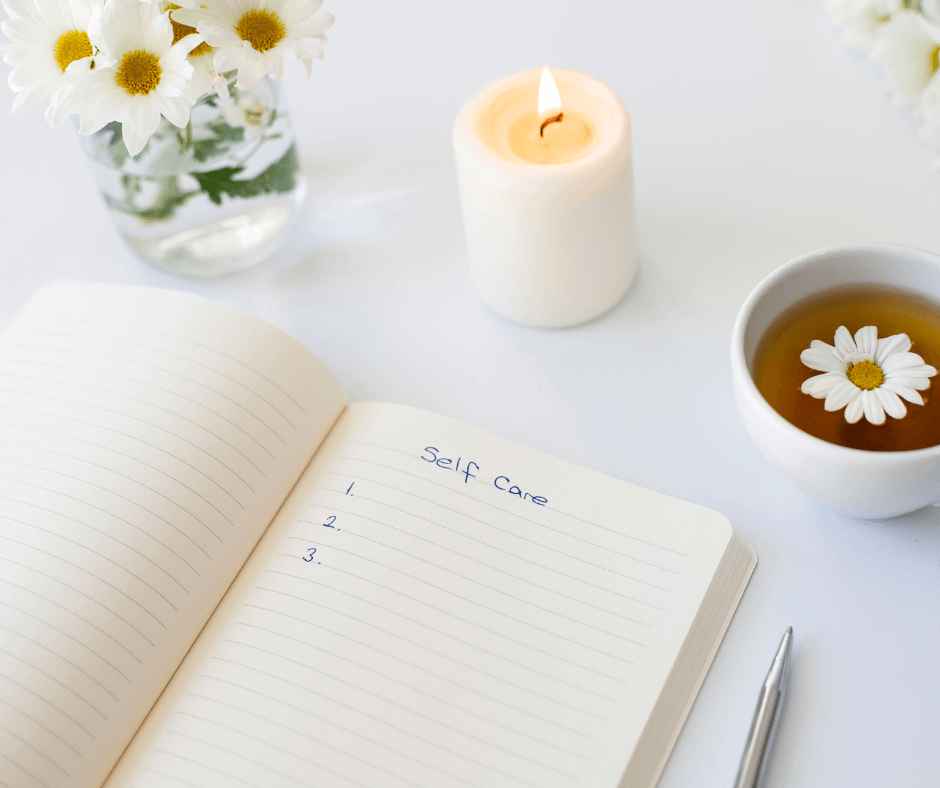Taking a mental health day is crucial for maintaining our well-being. Prioritising self-care is essential for reducing stress and uplifting our wellness.
Mental health days are designated breaks we can take to prioritise our emotional and psychological well-being. These days off (either from work, studies, or our usual routines) are crucial for managing stress, preventing burnout, and promoting overall mental wellness. Rather than physical ailments, mental health days address feelings of anxiety, depression, or overwhelming strain. They allow us to recharge, engage in self-care activities, and seek professional support if needed.
There’s now a growing recognition that taking mental health days can play a vital role in maintaining good overall health. Employers, organisations, and we as individuals are increasingly aware of the significant benefits that trying to prevent physical, mental, and emotional fatigue can have. Societal discourse is also shifting towards normalising mental health practices, fostering a culture of self-care and resilience in workplaces and communities.

Important Note: Mental health days are a temporary mental health tool that may give us time to address any issues or concerns. They are not a substitute for professional medical advice, diagnosis, or treatment.
How Stress Can Negatively Impact Our Health
Stress exerts a profound toll on both mental and physical health. It’s something that can sometimes be overlooked when experiencing certain issues, but there’s no doubt that the impact it has on our well-being should not be ignored. Safeguarding both mental and physical wellness is essential if we are to continue living, working, studying, and cultivating life’s experiences. It can manifest in numerous ways, including:
Mental Health
- Anxiety Disorders: Stress can trigger or exacerbate symptoms of generalised anxiety disorder (GAD), panic disorder, and social anxiety disorder (among others).
- Depression: Prolonged stress can contribute to the development or worsening of depressive symptoms.
- Cognitive Impairment: Stress can impair memory, concentration, and decision-making abilities.
- Mood Swings/Changes: There can be increased irritability, moodiness, and emotional instability.
- Insomnia: Stress often disrupts sleep patterns, leading to difficulties falling asleep or staying asleep—which, of course, causes fatigue and exhaustion.
Physical Health
- Elevated Blood Pressure: Chronic stress can increase blood pressure, raising the risk of cardiovascular diseases.
- Weakened Immune System: Stress suppresses immune function, making individuals more susceptible to infections and illnesses.
- Digestive Issues: Stress can exacerbate conditions such as irritable bowel syndrome (IBS) and contribute to stomach ulcers.
- Muscle Tension and Pain: Stress can cause tension headaches and migraines and exacerbate existing muscle pain.
- Increased Risk of Chronic Diseases: Prolonged stress is associated with a higher risk of developing chronic conditions like obesity, diabetes, and autoimmune disorders.
The Rising Prevalence of Burnout in Modern Society
Fueled by factors such as demanding work schedules, high job expectations, and constant connectivity, burnout affects individuals across various professions and lifestyles. Modern technologies blur the boundaries between work and personal life, amplifying stress and exhaustion. There are also a wide range of life’s challenges and difficulties to deal with, as well as societal pressures, economic uncertainties, racial disparities and trauma caused by racism, and political division contributing to heightened stress levels.
Burnout manifests as emotional exhaustion, cynicism, reduced professional efficacy, and personal distress or difficulties; it also undermines individuals’ mental and physical health, impacting quality of life. Addressing this issue requires a social attitude shift alongside systemic changes in workplace culture, healthcare policies, and equitable access to resources.

The Benefits and Value of Mental Health Days
Depending on personal circumstances and the resources available, mental health days involve taking time off from work or daily responsibilities to do things that uplift and support relaxation and being able to recharge. It’s also a time to address any underlying stressors—which could mean seeking professional support when needed. The benefits of these days can include:
- Stress Reduction: A break from work or daily routines allows us to unwind and rejuvenate, lessening levels of anxiety, etc.
- Mental and Emotional Balance: A chance to address emotional needs, fostering hardiness and adaptability while promoting a healthier mindset.
- Enhanced Self-Awareness: A way to encourage introspection and self-care practices, promoting greater cognizance and emotional intelligence.
- Building Resilience: Taking time in this way can equip us with coping strategies to better navigate challenges and setbacks.
- Burnout Prevention: A way to allow us to recognise and address signs of exhaustion before they escalate.
- Better Relationships: Taking care of our mental health can lead to improved communication and connections with others.
- Improved Work-Life Balance: Finding ways to achieve a healthier balance between work or other responsibilities and our personal life can lead to greater overall satisfaction.
- Raising Mental Health Awareness: Normalises talking about and caring for our mental health helps reduce stigma and encourages open dialogue about well-being in both personal and professional spheres.
- Physical Health Benefits: A positive ripple effect on physical health can be achieved, such as a reduction in the risk of stress-related illnesses.
Recognizing When It’s Time To Take a Mental Health Day
Many of us will experience a range of symptoms that may point to overwhelm, stress, and a need to practice some self-care. Not everyone will experience this in the same way or require a mental health break for the same reasons, but there can be some useful things to look out for and be aware of, such as:
- Persistent fatigue or exhaustion.
- Increased irritability or mood swings.
- Difficulty concentrating or making decisions.
- Loss of interest in activities once enjoyed.
- Frequent headaches or physical tension.
- Heightened anxiety or feeling emotionally drained or disconnected.
- Decreased productivity or motivation.
- Difficulty sleeping or changes in appetite.
- Feeling emotionally drained or disconnected.
Important Note: If your emotional well-being or mental health is significantly impacting your ability to function and/or enjoy life, seeking professional support from a therapist or counselor is recommended.
Individual needs, interests, and the availability of resources will dictate what is appropriate and effective, but there are no restrictions or rules about what can and cannot be practiced on a mental health day—as long as it actually prompts rest and recovery. Activities like meditation, exercising, nature walks, reading, taking time for personal hygiene care, watching favourite movies and shows, spending time with friends and family, attending therapy, or anything else that focuses on self-care are ideal.

Useful Ways To Overcome Barriers to Mental Health Days
Although taking care of our mental and emotional health should be a priority, it’s not always an easy undertaking. There can be any number of issues to overcome, including time constraints, stigma, lack of access, personal responsibilities, or restrictions from work (if that’s what we need to take time away from). Figuring out when and how we should focus on ourselves can come up against some common barriers, but there may be things we can do.
Work Culture
In some workplaces, there may be a stigma around taking time off for mental health reasons. Employees may fear judgement or repercussions from their managers or colleagues.
If there are no policies available where employees are given options for days off (aside from sick days), then the choice may be restricted to finding time during the weekend or other allotted non-working hours. It’s also possible to try talking to the boss or HR about taking some time off (which does not have to be a whole day). This, of course, may be further complicated by having to find childcare or putting off or rearranging personal chores. This is where having a support network (family, friends, or community programmes and resources) really come into play.
Fear of Judgement
Admitting to ourselves, let alone to employers, work colleagues, or family and friends, that we need to take some time to decompress can be difficult. Fears about being perceived negatively for doing so or being invalidated (or worse, ignored) may keep us from speaking up.
To make it easier to ask for support, we should practice direct, clear, and assertive communication that focuses on expressing our needs. If possible, we should confide in and get assistance from supportive allies like trusted family, friends, colleagues, and supervisors who can advocate for us or support us as we advocate for ourselves.
Perfectionism or High Expectations
This may stop some of us from acknowledging our need for a mental health day. Internal or external pressure to meet unrealistic or exhausting standards can leave us feeling like we cannot (or should not) take time for ourselves.
Balancing perfectionism or high expectations with the mindfulness to take care of our mental well-being requires us to understand that if we don’t take care of our own needs, we will eventually be unable to maintain the progress, achievements, or order that we work so hard to uphold. Seeking guidance and support from a therapist, mentor, or trusted friend can help provide much-needed perspective and encouragement. We can also try to stay present and non-judgmental and regularly challenge unrealistic thoughts and beliefs about productivity and self-worth.
Lack of Support
Many of us will hesitate to take a mental health day if we feel unsupported or misunderstood, and especially if we worry about falling behind in our work or other responsibilities.
Overcoming a lack of support requires proactive steps. We should clearly communicate our need for a mental health day that emphasises how taking care of ourselves maintains our well-being and productivity. We should seek out support from other people in our lives who can offer guidance and/or resources. We should also make use of community or online groups that provide hotlines, advice, or practical assistance.
Race-Based Prejudice and Stereotyping
Obstacles that impede equitable access to mental health support and treatment are often driven by a combination of institutional and/or interpersonal racism. Successful care can sometimes be hindered by discriminatory beliefs and policies that create disparities within mental health medicine for People of Colour.
Systemic changes are essential to make sure everyone has equal and equitable access to mental health care. Increasing community-based services, dismantling institutional racism within mental health systems, and promoting diversity in the mental health workforce are crucial steps. However, this is not something that will happen quickly, nor is it the sole responsibility of those who encounter this discrimination to try and fix it—especially when taking a mental health day for themselves.
One way to overcome these barriers is to search for culturally competent care. Utilising online directories or databases that specialise in listing mental health groups, advice hotlines, resources, or professionals from diverse backgrounds is a great place to start. It could also be beneficial to talk to friends and family to see what resources and assistance they use or know of.

There will be other barriers to overcome that are not mentioned here, but hopefully the ones that have been highlighted reveal the importance of trying to find a way around them. Finding a balance that nurtures and fortifies our emotional and mental health is a path to empowerment—something none of us should shy away from or put off doing.
In Summary
Taking a mental health day is crucial for our overall well-being. In today’s fast-paced world, stress and burnout are common, potentially leading to negative impacts. Taking time to care for ourselves provides essential time for rest, self-care, and rejuvenation. They allow us to recharge, reduce stress levels, and prevent or deal with short or long-term mental health issues.
Prioritising emotional and mental health days promotes productivity, creativity, and resilience. It also fosters a healthier work-life balance and strengthens relationships. Recognising the importance of mental health days is a vital step towards creating supportive environments where all of us can thrive both personally and professionally.
If you haven’t taken time for yourself recently, don’t put it off too long. We all deserve some care.
What do you do on a mental health day that helps you relax?
Further Info:
A Guide to Starting Your Mental Health Journey – Vox
NAMI Helpline – a free, nationwide U.S. resource that offers experienced peer-support guidance and advice
FindAHelpline – global (by country) resources for free, confidential mental health support
Safe In Our World – a list of global (by country) LGBTQ+ mental health resources and support


I love that you’ve linked to NAMI – in this post and others, I think, Molly. A terrific resource in the U.S. and I’m proud to be a member and supporter. 🥰
LikeLike
It’s a great resource for support, so I’m happy to include it whenever I can!
LikeLike
This is very in-depth and so important – thank you for sharing this with us!
LikeLike
Thank you! I hope this reminds people to take a day if they can (very important for our well-being).
LikeLiked by 1 person
It’s important to take a mental health day when you need to. It’sgood to take a step back and just focus on yourself x
Lucy |
LikeLike
I agree—being able to take time for ourselves can really help us maintain our overall health and wellness.
LikeLike
I think taking a mental health day, even if you don’t have ‘bad’ mental heath, as it’s a great reset to rest or reconnect with something you enjoy!
LikeLike
Exactly right! We should take care of our well-being even if we’re doing well. It should be something we maintain whenever we can.
LikeLike
You are right Molly, everyone needs to take some time for themselves. I used to work in this field; luckily the company I worked for had mandatory time off. After 5 years, we had to take a one-month sabbatical, it was needed, and greatly appreciated too. Great article Molly!
LikeLike
It sounds like the place you worked for had the right mindset (and resources/policies) in place for this. I hope more employers, companies and organizations facilitate mental health days without obstacles, etc.
LikeLike
This is such an informative post! Despite the fact that I am now retired, I feel like I need to take a mental health day (or week) every once in a while away from the stress of supporting my family through declining health. Self care is important at every stage in life, isn’t it?
LikeLike
I think mental health days are essential no matter our circumstances. All of us will need some time away from our usual routines (whatever they may be) to deal with stress, etc. Self-care is definitely important!
LikeLike
Wonderful post, Molly! Mental health days are vital and I’m glad it’s more common nowadays. I’m glad you also shared ways to overcome barriers. I hope to see a positive shift where everyone can find balance and prioritize their mental and physical well-being. Thanks for sharing!
LikeLike
I also hope that obstacles to taking a mental health day (especially from work) are further removed as we become more aware of their benefits. It’s much better than it used to be, which is encouraging!
LikeLike
Such a good post, I agree taking time to yourself is soooo important! Thanks for sharing!
xoxo, Midori
LikeLike
It’s essential, so I hope this becomes more accessible to do for many more people. Thanks for reading!
LikeLike
These are some really important reasons why you should take a mental health break. Looking after your mental health is so important. This is a great post for awareness. Thank you for sharing.
Lauren – bournemouthgirl
LikeLike
I really hope this does raise a bit of awareness as these days to care for ourselves are so important.
LikeLike
Taking mental health day is part of selfcare. As you outlined, stress can lead to many health conditions. Thanks for reminding us to exercise selfcare.
LikeLike
I agree, it’s an essential part of how we can take care of ourselves. Thanks for reading!
LikeLike
I’ve always wondered why it’s so easily accepted that people can have sick days when they’re physically ill but when they need time out for their mental health, it’s seen as shirking. Everything is linked, and it’s important to care for ALL our health, holistically and completely. Fab post, Molly!
LikeLike
I agree, if sick days are so easily accepted as necessary to care for ourselves, then mental health days should be seen in exactly the same way. I hope this does become the norm for all of us!
LikeLike
Yeah, it’s important to take note on mental health. I’m healing from burnouts now. I decided to take things slow this Ramadan. I just need to focus on my health and prayers.
LikeLike
This is so true, we need to be able to listen to our minds and bodies when we need a break. I am glad you are taking things slow and concentrating on what uplifts you.
LikeLike
Growing up I can remember people being praised for over working and always being at their jobs but now as an adult I’m glad I am learning that over work and not taking car of yourself can take a toll on you. Now looking back I can remember a lot of these people were going through some mental health problems and never addressed. I am glad that now its encouraged to take careof yoursekf.
LikeLike
You’re 100 right that there has been this push to constantly be productive. It simply isn’t healthy to exist in that way (it does everything for your employer but nothing for yourself), and I am so glad that this way of existing is slowly being seen for what it is—unhealthy and not sustainable.
LikeLike
I think it’s a good idea to take a mental health day when you’re overwhelmed or stressed. Great article!
LikeLike
I agree; it’s much needed to make sure we can take care of ourselves.
LikeLike
What a fantastic article, Molly and so important! I think it wasn’t until a few years ago that I truly learned the value of slowing down and nowadays so many people are burning out and it’s hard to know when too much is too much. This is super informative thanks for sharing 🙂
LikeLike
Slowing down and taking time to care for our needs is so vital to our well-being. It’s great to hear you are doing this for yourself and see the value in it. Hopefully, other people will realize that burning out does us no good and will slow down too!
LikeLike
I have such a hard time in doing this myself as someone with multiple diagnoses! The over-productive self always takes over.
LikeLike
It can be very difficult to take a mental health day, so be kind to yourself as you figure out how best to this!
LikeLike
This is a brilliant resource, Molly. I’m having a mental health day every weekend this month to ensure that I don’t burn out while working a new job!
Intentional Lucie
LikeLike
Having regularly scheduled days on the weekend is an excellent idea, it really helps prioritise your well-being!
LikeLike